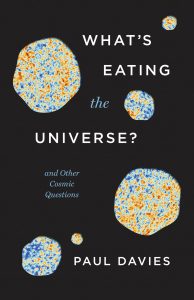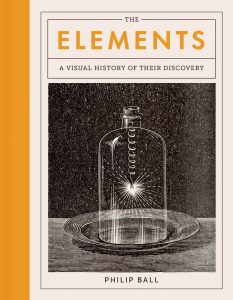Three Books to Change the Way You Think about Math & Science
Over the past year and a half, as researchers across the globe raced to develop effective COVID-19 vaccines, the world has been awed by the power of science to quickly combat a global crisis. It might make you wonder: Is there anything science can’t do or help us to understand? Perhaps not, if a trio of new books arriving this month is any indication. Spanning the elemental, cosmic, and mental realms, the insights they provide may surprise you.
The Elements: A Visual History of Their Discovery by Philip Ball
From water, air, and fire to tennessine and oganesson, celebrated science writer Philip Ball leads us through the full sweep of the field of chemistry in this exquisitely illustrated history of the elements. But Ball’s book isn’t just about the building blocks of our physical world. It’s about the many ways we’ve conceived of those building blocks over the millennia, how and why our ideas have evolved, and how our prejudices have influenced our opinion of those ideas’ value. Moving from prehistory to the age of particle accelerators, Ball sheds needed light on those who struggled for their ideas to gain inclusion.
“Ball has once again produced a terrific book, one that presents a tremendous amount of the history chemistry in a manner that is engagingly written, beautifully illustrated, and conscientious about avoiding the usual traps of popular science: triumphalism, a Eurocentric and male bias, and a reliance on just-so stories that are inadequately supported by the evidence. I cannot think of another popular history of chemistry I have so enjoyed reading.”—Michael D. Gordin, author of On the Fringe
What’s Eating the Universe?: And Other Cosmic Questions by Paul Davies

Combining the latest scientific advances with storytelling skills unmatched in the cosmos, award-winning astrophysicist and popular writer Paul Davies leads us on a tour of some of the greatest mysteries of our universe—from supermassive blackholes to aliens (possibly) in our backyards. A celebration as much of what we know as what we have yet to learn, Davies’s quest leads us up to the greatest outstanding conundrum of all: Why does the universe even exist in the first place? And how did a system of mindless, purposeless particles manage to bring forth conscious, thinking beings?
“What’s Eating the Universe? is a veritable feast for curious minds. Davies, a polymath and lyrical writer, masterfully tackles all the big questions ranging from why this Universe to the meaning of life and the significance of the present moment—a whirlwind journey through ideas that have shaped our understanding of the cosmos and its constituents.”—Priyamvada Natarajan, author of Mapping the Heavens
Geometry of Grief: Reflections on Mathematics, Loss, and Life by Michael Frame

At a moment of profound collective grief, we are all looking for tools that might help us to process and grow from the challenges of our time. Few would suspect that such tools might be found in basic geometry. In this profound and hopeful book, mathematician and celebrated teacher Michael Frame draws on a career’s worth of insight—including his work with the pioneer of fractal geometry Benoit Mandelbrot—to show how mathematics may help all of us (even the math-averse) to understand and cope with grief.
“With poignancy and audacity, Frame builds an unexpected bridge between mathematical beauty and human sorrow, illuminating both.”—Francis Su, author of Mathematics for Human Flourishing
“Immersed in Frame’s world of geometry and its applications to real-world emotions, I sometimes felt afloat in a mysterious, and always inviting, dream. It’s a beautiful place for all of us to spend time.”—Barbara J. King, author of How Animals Grieve
All of these books are available on our website or from your favorite bookseller.
